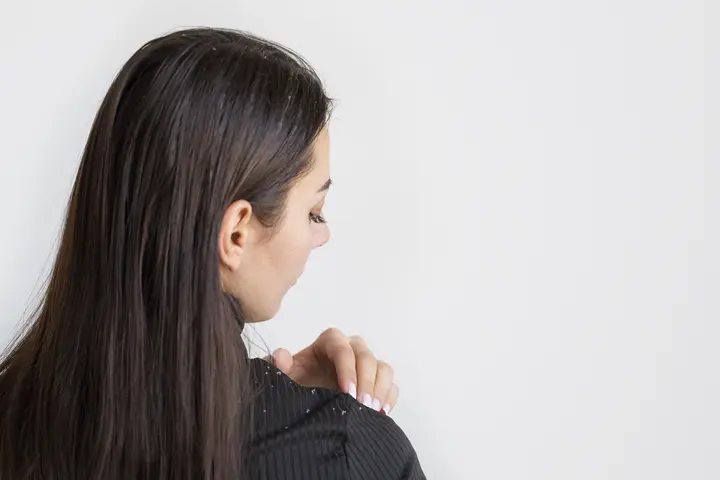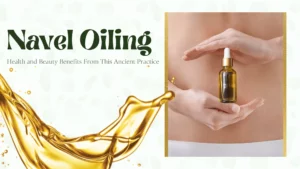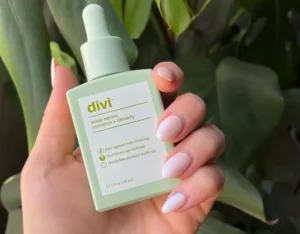Is your dandruff worse in winter? There’s nothing worse than wearing a sexy, sleek, black outfit only to have a different kind of snowflakes littering your shirt. For many people, dandruff is a common problem and worse during the colder months.
There are several reasons for this, including changes in weather and indoor heating, which can cause the skin on your scalp to become dry and flaky. Some other causes are an easy fix, like the type of shampoo and conditioner you use. Let’s find out the best ways to rid ourselves of dandruff for good.
What is Dandruff?
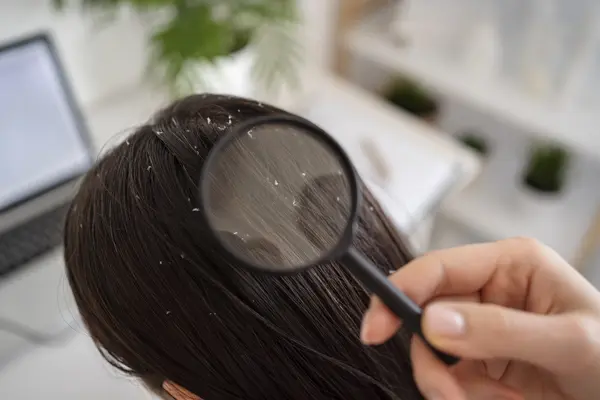
It’s gross! That’s a fact that we all know and can agree on. Seriously though, dandruff is tiny flakes of dead, dry skin cells that are shed off the scalp. The fungi Malassezia globosa is found on everyone’s top layer of skin on the scalp and can dry up and flake off when having a dandruff flare up.
It’s not a serious condition nor is it contagious– just mostly embarrassing. Your body sheds millions of dead, dry skin cells everyday. It’s just not as noticeable since it’s not on your head and shoulders like dandruff. If you are a blonde, you may be able to get away with it more. But brunettes know, having dandruff can make you rock a ponytail more often than you’d like.
How Often Should You Wash Your Hair?
What Causes Dandruff?
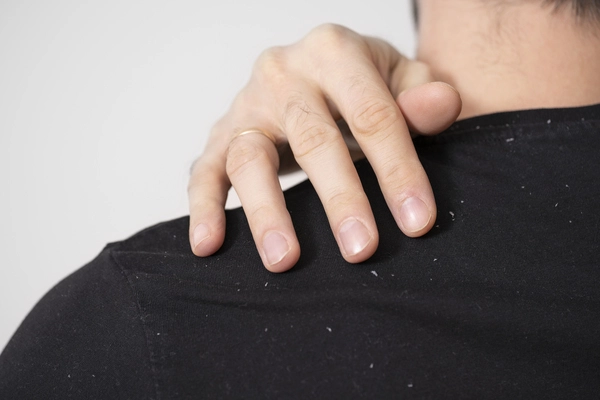
Dandruff is caused by a variety of factors, both internal and external. Changes in hormones, diet, stress levels, and hygiene habits can all contribute to the problem. Dandruff has been linked to consuming too many bad fats which may dry out the scalp and increase sebum production.
Additionally, weather conditions like cold temperatures and low humidity can also cause dandruff by making the scalp drier. Indoor heating, which is used more heavily in winter, can have a similar effect since it tends to dry out the scalp.
How to Fix Dandruff

You are definitely not alone when it comes to wanting to get rid of dandruff. It’s estimated that an astounding 50% of the world’s population suffers from dandruff in some form, including those who experience dandruff worse in winter.
The good news is that there are things you can do to fix dandruff, especially in those winter months. Start by trying these simple tips:
- Use a gentle, sulfate-free shampoo. Look for products that contain ingredients like tea tree oil or salicylic acid, which can help control flaking, as well as moisturizing shampoos and conditioners.
- Limit your use of styling products. Overuse of hair gels, mousses, and other products can contribute to dandruff by clogging the pores on your scalp.
- Wash your hair more often if necessary. Depending on how oily your hair is, you may need to wash it every day or every other day to keep dandruff under control.
- Stay hydrated and eat a healthy diet. Drinking plenty of water and eating a balanced diet helps keep your skin—including the skin on your scalp—healthy and moisturized from the inside out. Healthy, fatty fish oils will help moisturize your scalp which will reduce dry skin from flaking off. Salmon, tuna, avocado, nuts, bananas, yogurt, and olive oil are known to help improve dandruff.
- Try a medicated shampoo or hair cream. There are medicated shampoos and creams that can effectively treat even severe cases of dandruff. If over-the-counter remedies don’t work, talk to your doctor or dermatologist about prescription options.
- Do a hot oil treatment. A hot oil treatment can help moisturize the scalp and provide nutrients to help strengthen the protein in the hair and scalp, minimizing dry skin and flakes. You can try any hot oil treatments found at a beauty store or create your own with olive, coconut, or sunflower oil.
- Minimize Stress. While stress doesn’t directly cause dandruff, it does play a factor in worsening other conditions that alter your micro biology like inflammation and overproduction of the Malassezia globosa fungi on your scalp. Managing stress can help keep underlying issues at bay to minimize dandruff flare ups.
- Don’t touch or scratch your hair. It’s almost a habit to want to brush the dandruff off your head when you see it but this usually just makes it worse. Constantly touching or scratching your hair will just spread the dandruff, making it flake off and more visible. If your situation is very bad, consider tying your hair up or wearing a hat until your dandruff is fixed.
How To Make a DIY Hot Oil Hair Mask
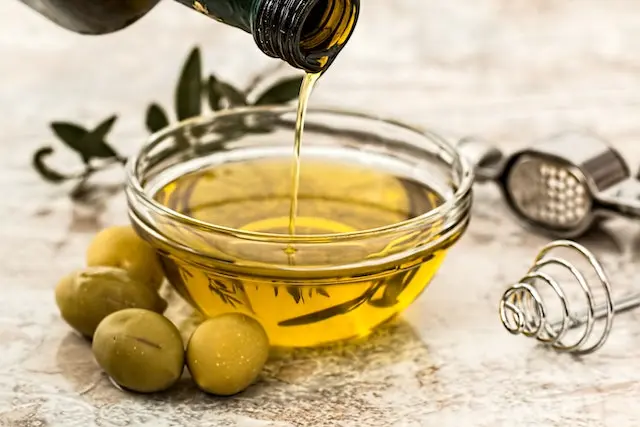
A DIY hot oil hair treatment mask is one of the easiest beauty treatments you can make at home, and you most likely already have all of the ingredients needed in-house.
All you need is a base or carrier oil; olive oil, coconut oil, sunflower oil, rosemary oil, grapeseed oil, jojoba oil, and peppermint oil are popular options. You can combine different oils as well to get different benefits and fragrances.
Heat 3-5 tbsp of oil, pending on how long your hair is. It’s best to double boil the oil: put the oil in a small heat-safe bowl which is then placed into another boiling pot of water for an even boil. You can microwave or heat the oil by itself on the stove but this may break down some of the nutrients in the oil.
Once the oil has cooled down enough where it’s warm but you can comfortably place your fingers in it, spread the oil generously on your scalp, rubbing it in in circular motions. Saturate your whole scalp then comb the rest of the oil from the roots to the ends of your hair.
Tie your hair in a bun or even better, cover it in a shower cap and let it sit for 20-30 minutes. Rinse with water and shampoo and condition as usual.
If you have a dry or itchy scalp, it’s best to do a hot oil mask every or every other week. Hot oil treatments will help deposit oil back into your hair and prevent the dryness that can contribute to dandruff.

